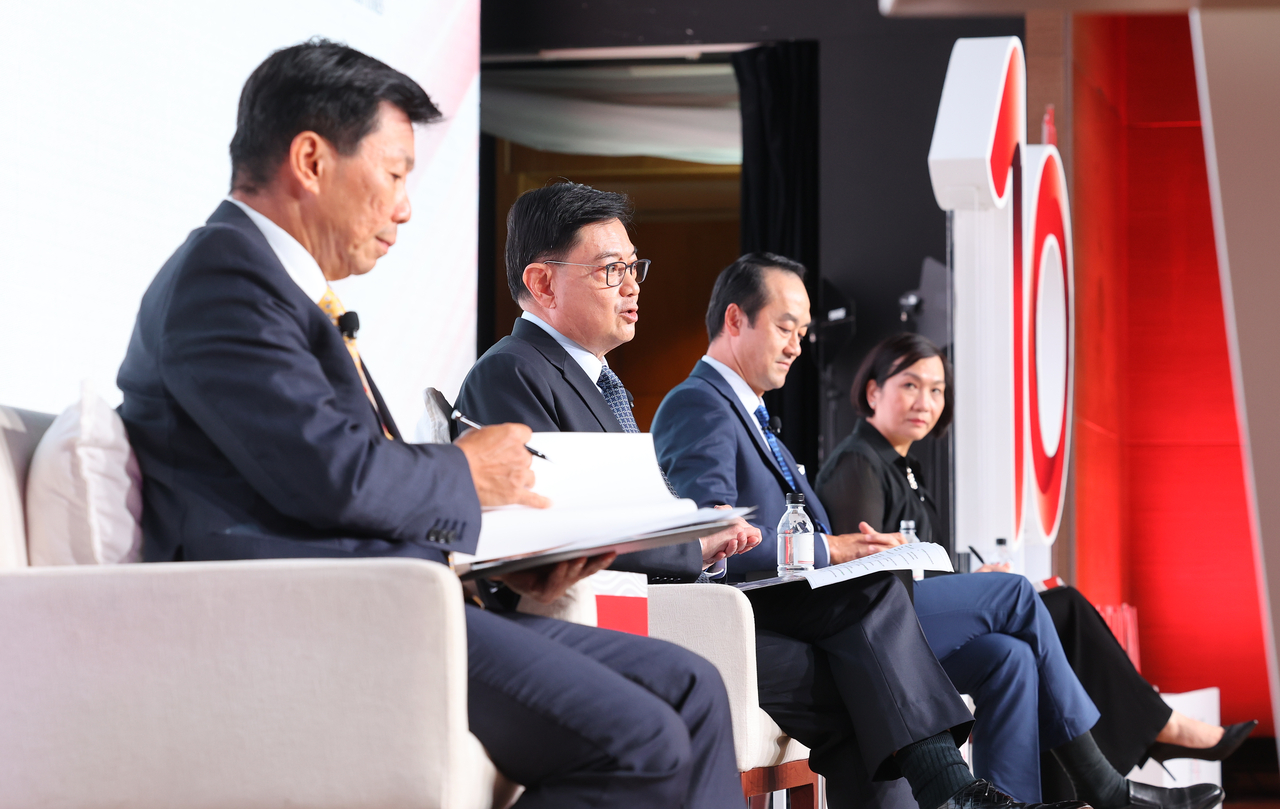Collaboration on digitalisation, sustainability key to S'pore, China's future: Panel
Sign up now: Get ST's newsletters delivered to your inbox

A panel discussion comprising (from left) Business China chairman Lee Yi Shyan, Deputy Prime Minister Heng Swee Keat, Senior Minister of State for Health and Manpower Koh Poh Koon and OCBC Bank group chief executive Helen Wong.
PHOTO: CMG
SINGAPORE - To bounce back stronger and make headway in a future beyond the Covid-19 pandemic, Singapore, China and the rest of Asia should work together to address the two major trends of digitalisation and sustainability, said government and business leaders at a Business China event on Monday (Nov 8).
As part of its annual awards night, the non-profit organisation, which aims to strengthen ties between Singapore and China, held a panel discussion comprising Deputy Prime Minister Heng Swee Keat, Senior Minister of State for Health and Manpower Koh Poh Koon and OCBC Bank group chief executive Helen Wong.
Business China chairman and former MP Lee Yi Shyan moderated the session, which took place in person at The Ritz-Carlton, Millenia Singapore, and was also streamed virtually.
In his opening remarks, Mr Heng noted that the trend of digitalisation had accelerated by leaps and bounds during the pandemic, with South-east Asia's digital economy projected to grow by three times by 2025.
Citing the Singapore-China (Shenzhen) Smart City Initiative and Singapore's digital trade documentation trials with two Chinese ports in Qinzhou and Tianjin, he said: "Fintech and digital payment will reshape not just finance, but also the global economy in a significant way. The digitalisation trend is here to stay, and we are just seeing the beginnings of a major revolution."
Added Mr Heng, who is also Coordinating Minister for Economic Policies: "I would encourage our businesses to think hard about how we can continue to collaborate with China and the region on the entire digitalisation trend."
Dr Koh said that even the traditionally "human-centric" space of health was becoming increasingly digitalised, with the advent of telemedicine, e-pharmacies, wearables and electronic records among other innovations.
This opens up opportunities for technopreneurs and businesses in different spaces to cross over, he added. "It is a way in which you can then capitalise on some of the increasingly digitised spaces, whether in Asean, China or many parts of the world."
In the area of sustainability, Mr Heng pointed out that there was "fresh momentum" with the ongoing United Nations climate change conference, or COP26, being held in Glasgow.
"Singapore takes sustainability seriously because we are one little island and there's nowhere to run," he said.
"Within this region, we can do a lot more. South-east Asia has huge potential - with its terrestrial forests, mangrove swamps and seagrass meadows, using nature-based solutions to sequester carbon can be a major game changer.
"But to do this well, we need a significant amount of investments, and we will need to look at how we can set standards for green investments," Mr Heng added, noting that Singapore hosts Climate Impact X, a global carbon exchange and marketplace.
Ms Wong said Singapore was playing a key role in building itself up into a sustainable finance centre serving Asean and linking up with North Asia.
She highlighted renewable energy, green buildings and the greening of supply chains as three important sectors for her bank and its corporate customers to actively get involved in.
Asked by the moderator, Mr Lee, what the manpower challenges faced by companies would be in a future dominated by trends such as digitalisation and sustainability, the panellists emphasised the importance of amassing regional knowledge, experience and networks.
Ms Wong said OCBC was looking into three-way staff exchanges between China, Singapore and an Asean country such as Malaysia.
Dr Koh pointed out that talent should envision playing a "tri-cultural" role as a conduit bridging East, West and Asean needs. This would be a Singaporean's "real value-add", he said.
Mr Heng noted that the Government has been supporting the development of regional business connections, through scholarships and fellowships over the years.
He recalled that when he was education minister between 2011 and 2015, he turned down a request to shift funding for exchange programmes from Asia to the United States and Europe, which were more popular destinations then.
"It is so important for our young people to know more about the region… to learn more about Singapore's immediate neighbourhood," said Mr Heng, who instead told his staff to work harder to get the students to Asean, China, India and the rest of Asia.
Three awards recognising individuals and businesses for contributions to bilateral ties between Singapore and China were also given out at the event.
Receiving the Excellence Award was Mrs Jennifer Yeo, founder of the Viva Foundation for Children with Cancer and wife of former foreign minister George Yeo.
A Young Achiever gong went to Ms Jessica Tan, co-chief executive and executive director at Chinese insurance company Ping An Group, while the China-Singapore Guangzhou Knowledge City project was recognised with an Enterprise Award.


